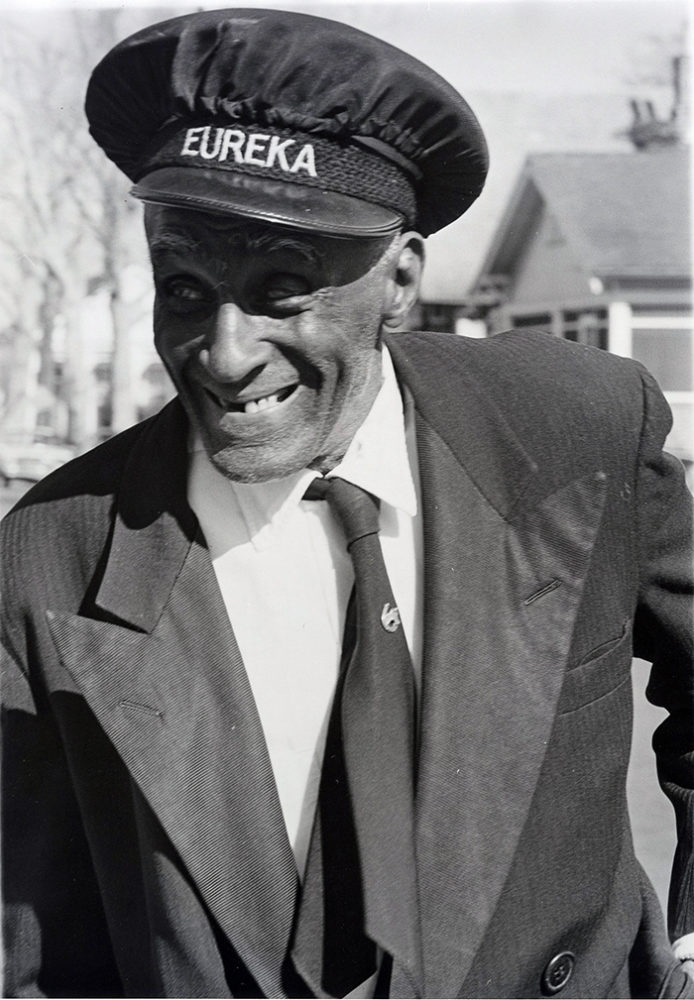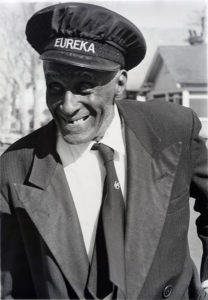Oscar Chicken Henry
Oscar “Chicken” Henry played both jazz piano and trombone in New Orleans in the mid-twentieth century.

Courtesy of Tulane University, William Ransom Hogan Archive of New Orleans Jazz
Oscar "Chicken" Henry. Harnden, Betsy (Photographer)
Considered an early “piano professor,” Oscar “Chicken” Henry was a New Orleans ragtime, jazz, and brass band trombonist and pianist. Henry was a regular performer in the Storyville red-light district before his hand was burned in an accident, leaving him unable to play piano professionally. It wasn’t until the late 1910s that Henry would take up the trombone, the instrument for which he would be best remembered. From the 1940s on, Henry performed with the Eureka Brass Band and was a frequent player at Preservation Hall. He was featured on the 1962 Atlantic Records recording Jazz at Preservation Hall, Vol. 1: The Eureka Brass Band of New Orleans.
Henry was born on June 8, 1888, on Coliseum Street in the Uptown area of New Orleans. After his parents bought him a piano, Henry taught himself the basics, supplementing playing by ear with formal lessons from Louise Edler, who had played at the French Opera House. Henry was influenced from an early age by minstrel bands and second lines, inspiration that would manifest itself in his later musical work. After attending Straight University (a precursor of Dillard University) for two years, Henry learned the plastering trade and went on to apprentice with the established plasterer and New Orleans jazz talent, Johnny St. Cyr. Plastering would later take him all over the country and beyond, including Cuba and Panama.
By 1906 Henry had become a recognized Storyville player. After the accident that left him unable to play piano, Henry dabbled in other instruments before taking up the trombone in late 1910s while living in Detroit, Michigan. He received instruction on trombone from Charlie Clay in Detroit and Alexander Valentine in Chicago, Illinois. Henry would travel often during his early career, following work and music throughout the Midwest and East Coast.
In 1923 Henry joined the Elks Concert Band in Chicago, in 1927 he toured throughout the northeast with a carnival band, and in 1930 he went to Hot Springs, Arkansas, with the Tonic Triad Band, a large ensemble from New Orleans. The Depression era would give Henry both a new job and a new nickname, “Chicken,” supposedly due to his knowledge of chickens and chicken wrangling. Because he could read music, Henry was hired to perform in brass bands created by the federally-funded ERA and WPA New Deal programs, along with many greats of the New Orleans jazz scene of that era, including Louis Dumaine, Lionel Ferbos, Israel Gorman, and Cié Frazier. Henry would also connect with Kid Howard during this time and perform as a regular member of Howard’s band.
In the 1940s Henry became an alternate trombonist for the Eureka Brass Band. When Sonny Henry died in 1960, Oscar Henry became a regular member of the band. The 1962 session on Jazz at Preservation Hall, Vol. 1: The Eureka Brass Band of New Orleans remains perhaps Henry’s definitive recording. The album also featured trumpeters Kid Sheik Colar and Peter Bocage, second trombonist Albert Warner, and drummer Cié Frazier.
Henry died on December 14, 1984, in Los Angeles, California.
